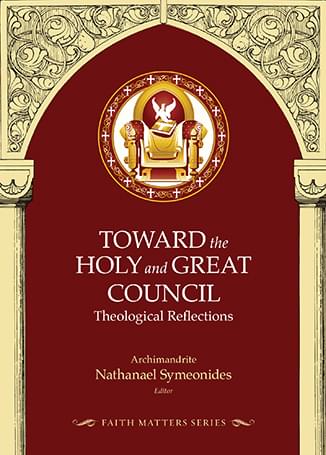New York
Sermon
Sermon
Sermon
Syllabus
Sermon
Sermon

Full Text on Public Orthodoxy
Purchase the book from The Orthodox Marketplace
A collaborative essay from Fr. Robert M. Arida, Susan Ashbrook Harvey, David Dunn, Maria McDowell, Teva Regule, and Bryce E. Rich. First published online at Public Orthodoxy in a series sponsored by the Orthodox Theological Society in America’s Project on the Holy and Great Council.
The authors of ‘The Mission of the Orthodox Church in Today’s World’ are to be commended for framing our shared ecclesial mission as one of making present the eschatological hope of the new creation in which “race, gender, age, social, or any other condition” are no bar to shared eucharistic celebration. The document rightly reminds us that “the purpose of the incarnation … is the deification of the human person” which establishes the dignity of all persons, and demands its protection. As co-workers with God, the church and its members enter into “common service together with all people of good will,” seeking to establish peace, justice (3, 6), and social solidarity (6.4, 6.5, 6.6), gifts of the Holy Spirit which come from God (3.2) but “also depend on human synergy” (3.3). These gifts, and this work, is required for the flourishing of human dignity.
…
Thus, the document’s claims to solidarity, shared anxiety and commitment to compassion for all of God’s creation are undermined by its selective understanding of human rights and its refusal to acknowledge the shortcomings of Orthodox in these areas. It undermines the longstanding engagement of Orthodox theologians and pastors with the world, shaped by the world, so that it may exist and live for the life of the world. Unfortunately, by repeated contrasts between the church and a secular, violent, morally-lax world, this document tends to encourage a church turned in on itself rather than turned outward to engage truly in service. It is unfortunate, but perhaps telling, that “freedom understood as permissiveness” (8.13) is corrected simply by a reminder that freedom comes with responsibility. Rather, in light of the deifying purpose of the Incarnation, and the hope it offers, would that this document offered a vision of freedom for the other, freedom not to fear the “infinite anxiety” (2.2) which fills humanity, but freedom to love the other with “joy, peace, patience, kindness, generosity, faithfulness, gentleness, and self-control.”
